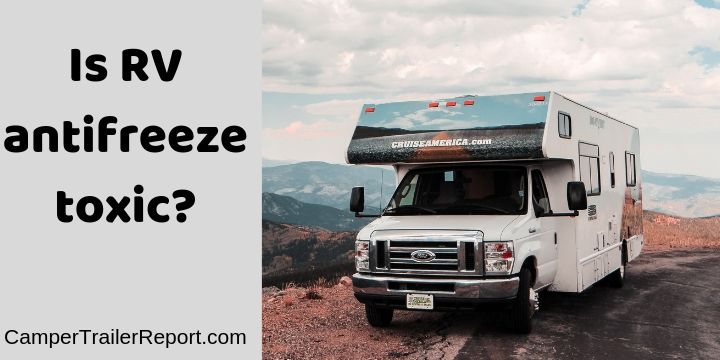Is RV antifreeze toxic?
RV antifreeze is a liquid substance used to prevent the plumbing system of an RV from freezing during freezing weather in winter, via a process called winterizing, to avoid breaking or bursting the pipes.
There have been concerns about the toxicity of the substance; I will discuss this further down.
Is Rv anti-freeze toxic?
Unlike regular anti-freeze that is used on automobile engines, RV anti-freeze is non-toxic. The reason is that its purpose is to protect the pipes of an RV when it is pumped through the plumbing system.
It will therefore not make sense for it to be toxic if it is going to be in close contact with the potable water running through the plumbing system. RV anti-freeze is therefore non-toxic.
However one should be careful about its disposal. It is advised to thoroughly follow instructions on how to properly dispose of it, so as not to harm the environment.
>> You may also like:45 RV Accessory Must-Haves for Your Travel Trailer<<
What do you need to know about RV anti-freeze?
The following are the most common facts to know about the RV anti-freeze;
Is it essential to use an RV anti-freeze
Yes, it is unless you want your pipes to burst and break, in which case it will be very costly and time-consuming to replace them. Is there a difference between a regular anti-freeze and the RV anti-freeze?
The main difference is that regular anti-freeze is toxic, whereas the RV anti-freeze is non-toxic.
Video Overview: My RV anti-freeze froze! (Testing RV anti-freeze burst properties)
Are there different types of anti-freeze?
Is RV anti-freeze dilutable?
Would the anti-freeze change the taste of water?
Draining the whole plumbing system after winterizing the RV, would be perfect for preventing the slight change in taste.
Video Overview: RV Winterization Basics For Beginners
https://www.youtube.com/watch?v=3xN2-ahkL5g
Does an anti-freeze expire?
If sealed properly after being opened, the anti-freeze usually has a shelf life of 2 to 3 years. A rule of thumb is always to re-use an anti-freeze that has been properly sealed and stored.
Is it possible to winterize an RV without anti-freeze?
Which quantity of anti-freeze is required for an RV?
There isn’t a set quantity required, as it much depends on the size of the RV. Logically, bigger RVs will need more anti-freeze than smaller ones.
The winter can be harsh on your vehicle, especially its plumbing system. Avoid the hassle of having to spend a large sum of money fixing and replacing your RV’s plumbing system, by winterizing it with an anti-freeze.
>> You may also like: Least-Visited National Parks: Why They’re Worth a Look<<
